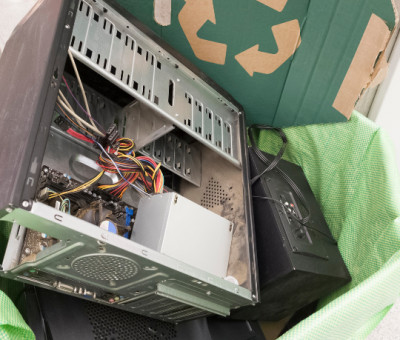Sustainable Solutions: The Imperative of Responsible Electronic Waste Management
Sustainable Solutions: The Imperative of Responsible Electronic Waste Management

In our rapidly evolving digital landscape, the proliferation of electronic devices has become ubiquitous, offering unparalleled convenience and connectivity. Yet, amidst this technological advancement lies a pressing environmental challenge: electronic waste (e-waste) disposal. This article delves into the critical importance of responsible e-waste management, exploring its environmental, social, and economic dimensions, and advocating for the adoption of sustainable solutions.
Environmental Imperatives:
E-waste harbors a myriad of hazardous materials, including lead, mercury, cadmium, and flame retardants. When improperly disposed of, these toxins can infiltrate soil, water, and air, posing grave risks to ecosystems and human health. By embracing responsible recycling practices, we can mitigate environmental pollution and safeguard fragile ecosystems from irreversible damage.
Exploring the Environmental Footprint:
The consequences of e-waste extend far beyond mere disposal. From soil and water contamination to air pollution and habitat destruction, the environmental footprint of electronic waste is profound and far-reaching. Through a comprehensive examination of these ecological repercussions, we gain a deeper understanding of the urgent need for sustainable e-waste management strategies.
Social and Economic Dimensions:
Responsible e-waste management not only protects the environment but also fosters social equity and economic prosperity. By promoting job creation, stimulating innovation, and complying with regulatory frameworks, e-waste recycling initiatives offer tangible benefits to communities and industries alike. Furthermore, by prioritizing data security and regulatory compliance, we uphold individual privacy rights and legal obligations, enhancing trust and accountability in the e-waste recycling process.
Resource Conservation:
At the heart of responsible e-waste management lies the imperative of resource conservation. By recovering precious metals, rare earth elements, and other critical materials from discarded electronic devices, we minimize the need for virgin resource extraction and reduce environmental degradation. Embracing circular economy principles, we create a regenerative system that maximizes resource efficiency and minimizes waste, laying the foundation for a sustainable future.

Challenges and Opportunities:
Despite the growing awareness surrounding e-waste, significant challenges persist in its management and disposal. Illegal dumping, informal recycling practices, and inadequate infrastructure pose formidable obstacles to effective e-waste recycling efforts. Additionally, disparities in access to recycling facilities and educational resources exacerbate social inequalities, hindering progress towards sustainable e-waste management.
However, amidst these challenges lie immense opportunities for innovation and collaboration. By investing in research and development, advancing recycling technologies, and fostering partnerships between government, industry, and civil society, we can overcome barriers to e-waste management and unlock the full potential of sustainable solutions. Moreover, by empowering communities through education, awareness-raising, and capacity-building initiatives, we can cultivate a culture of environmental stewardship and collective responsibility.
Case Studies in Sustainable E-Waste Management:
Across the globe, innovative initiatives are emerging to address the complex challenges of e-waste management. From community-led recycling programs to corporate sustainability initiatives, these case studies offer valuable insights into effective strategies for responsible e-waste disposal.
In Sweden, for example, the government has implemented an extended producer responsibility (EPR) framework, requiring manufacturers to take financial responsibility for the end-of-life management of their products. This approach has incentivized product design for recyclability and facilitated the collection and recycling of e-waste through a network of certified recycling centers.
Similarly, in India, informal e-waste recycling hubs have transformed into formalized recycling enterprises through partnerships with government agencies and non-profit organizations. By providing training, technical assistance, and access to markets, these initiatives empower informal recyclers to adopt safer and more sustainable practices, while generating livelihood opportunities for marginalized communities.
Lessons Learned and Recommendations for Action:
Drawing from these case studies and best practices, several key lessons emerge for advancing sustainable e-waste management:
- Foster collaboration and partnership among stakeholders, including government agencies, industry associations, non-profit organizations, and local communities.
- Invest in research and development to improve recycling technologies, enhance resource recovery, and minimize environmental impacts.
- Promote consumer awareness and education on the importance of responsible e-waste disposal, including the benefits of recycling and the risks of improper disposal.
- Strengthen regulatory frameworks and enforcement mechanisms to ensure compliance with e-waste management standards and regulations.
- Support the development of infrastructure for e-waste collection, transportation, and recycling, particularly in underserved communities and regions.
By embracing these recommendations and committing to collective action, we can build a more sustainable and resilient future for generations to come.
Conclusion:
In conclusion, the imperative of responsible e-waste management demands urgent attention and concerted action. By addressing the environmental, social, and economic dimensions of e-waste, we can mitigate environmental pollution, foster social equity, and promote economic prosperity. Through collaboration, innovation, and commitment to sustainable solutions, we can transform electronic waste from a looming environmental threat into an opportunity for positive change. Together, let us embrace the challenge of e-waste management and work towards a greener, more sustainable future for all.
Source: Let's Get Trash
Content is originally from Let's Get Trash
Please contact press@gizmogo.com for copyright concerns
© 2026 UC Technology Inc . All Rights Reserved.